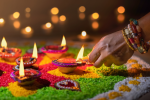It's a time of joy, togetherness, and spiritual reflection.
As we prepare to celebrate Diwali in 2023, let's delve into some of the significance of this vibrant festival and explore the traditions and customs.
What is Diwali and when is it?
Diwali, often referred to as the "Festival of Lights," is celebrated with great enthusiasm and splendor by millions of people around the world. This holiday typically falls in October or November, marking the victory of light over darkness and good over evil. It is a time to dispel ignorance and welcome knowledge and wisdom into our lives.

Significance and Traditions of Diwali
Diwali holds different meanings to those within the South Asian community, and every individual connects with the holiday in their own way. There are cultural, social, and religious significances that are recognized and celebrated across the world with some beautiful traditions. Some of those traditions and customs can include:
Lighting Diyas: Lighting earthen lamps or diyas is central to Diwali. The warm glow of these lamps symbolizes the victory of light over darkness and the dispelling of ignorance.
Rangoli: Intricate and colorful rangoli designs are created at the entrance of homes to welcome guests and add to the festive ambiance.
Firecrackers: Fireworks are a common part of Diwali celebrations, representing the joy and excitement of the festival.
Sweets and Treats: Diwali is synonymous with indulging in delicious sweets and savories. Families prepare a wide variety of traditional dishes and exchange them with neighbors and friends.
Decorating Homes: Homes are cleaned and decorated with things like colorful lanterns, flowers, or tapestries. The aim of this tradition is to make your space feel welcoming and bright.
Let’s Celebrate!
Whether you're with family or friends, let the light of Diwali illuminate your life and bring you hope, joy, and renewed energy for the year ahead. Happy Diwali!
